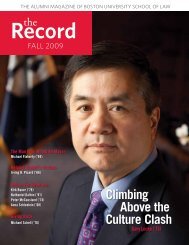the nature of representation: the cherokee right ... - Boston University
the nature of representation: the cherokee right ... - Boston University
the nature of representation: the cherokee right ... - Boston University
Create successful ePaper yourself
Turn your PDF publications into a flip-book with our unique Google optimized e-Paper software.
150 PUBLIC INTEREST LAW JOURNAL [Vol. 15<br />
V. CONCLUSION<br />
The push for a Cherokee delegate should be a catalyst for greater U.S. support for<br />
<strong>the</strong> Cherokees if Constitutional challenges to <strong>the</strong> Cherokee delegate <strong>right</strong> prevent<br />
<strong>the</strong> Cherokees from realizing <strong>the</strong>ir treaty-based <strong>right</strong> to a delegate. Cherokees could<br />
lose <strong>the</strong>ir <strong>right</strong>, but if <strong>the</strong>y do, <strong>the</strong> Cherokees deserve to be compensated for such a<br />
loss.<br />
A Cherokee delegate in Congress would fundamentally alter <strong>the</strong> relationship<br />
between <strong>the</strong> U.S. government and <strong>the</strong> Cherokee Nation, and, as a practical matter,<br />
between <strong>the</strong> U.S. and all tribes. Presently, <strong>the</strong> U.S. and Indian tribes relate on a<br />
government-to-government basis. 296 A Cherokee delegate would incorporate <strong>the</strong><br />
Cherokees into <strong>the</strong> U.S. government, resulting in a switch to a tribal governmentin-<strong>the</strong>-government<br />
relationship. 297 Some tribal leaders have stated that sometime in<br />
<strong>the</strong> future a tribe should work towards greater incorporation. For example, former<br />
Navajo President Peterson Zah said <strong>the</strong> Navajo Nation should consider pushing for<br />
statehood. 298 The Cherokees, however, already have a treaty-based <strong>right</strong> to instant<br />
incorporation. With <strong>the</strong> Cherokee Nation seated in <strong>the</strong> U.S. legislature, <strong>the</strong><br />
division between ward and guardian would be broken down through <strong>the</strong> merger <strong>of</strong><br />
<strong>the</strong> two sovereigns in a single delegate. Non-Cherokee leaders justifiably could fear<br />
that this overlapping governance structure would lead not only to a relative primacy<br />
<strong>of</strong> <strong>the</strong> Cherokee nation, but also to a diminution <strong>of</strong> <strong>the</strong> government-to-government<br />
relationship for all tribes.<br />
There are many political and ideological reasons why a Cherokee delegate would<br />
be opposed by non-Indians and Indians alike, should <strong>the</strong> Cherokees push for <strong>the</strong>ir<br />
delegate. Many Indian scholars and Cherokees would argue that as an absolute<br />
matter <strong>the</strong> Cherokees have a <strong>right</strong> to <strong>the</strong> full realization <strong>of</strong> <strong>the</strong>ir delegate. But if <strong>the</strong><br />
U.S. government rejects <strong>the</strong> Cherokee advocates’ position, <strong>the</strong> inquiry into <strong>the</strong><br />
Cherokee delegate will not end, nor must Article 7 necessarily become yet ano<strong>the</strong>r<br />
U.S. violation <strong>of</strong> an Indian treaty.<br />
The Supreme Court has repeatedly upheld legislative action that infringed upon<br />
296<br />
Exec. Order No. 13,175, 65 Fed. Reg. 67,249 (Nov. 6, 2000).<br />
297<br />
In 1878, when an Indian Territory delegate was being considered, <strong>the</strong> Cherokees<br />
opposed such a delegate, but The Cherokee Advocate included a quotation from <strong>the</strong><br />
Missouri Republican that highlights <strong>the</strong> power <strong>of</strong> a delegate to incorporate tribes into<br />
<strong>the</strong> U.S. government:<br />
The <strong>the</strong>ory <strong>of</strong> our treatment heret<strong>of</strong>ore has been that <strong>the</strong>y are independent nations.<br />
But this is a fiction. There are not independent powers, and we do not regard <strong>the</strong>m<br />
in that light. We subject <strong>the</strong>m to our laws, break our treaties with <strong>the</strong>m whenever<br />
<strong>the</strong>y become irksome to us, and move <strong>the</strong>m from one place to ano<strong>the</strong>r to suit our<br />
convenience. We might as well incorporate <strong>the</strong>m into <strong>the</strong> body politic at once, and<br />
give <strong>the</strong>m <strong>the</strong> privilege <strong>of</strong> being represented in <strong>the</strong> national council by a delegate <strong>of</strong><br />
<strong>the</strong>ir own choosing.<br />
The Cherokee Advocate, Jan. 5, 1878, at 2.<br />
298 Keynote speech, 15th Navajo Studies Conference (Oct. 2004).









